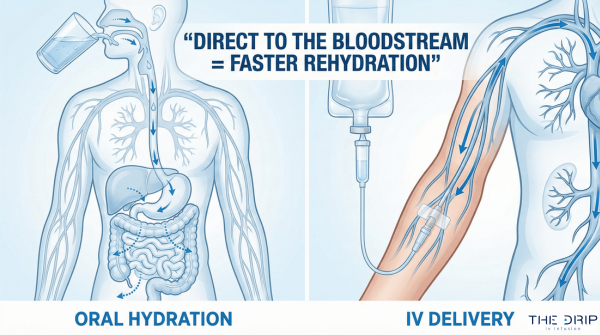Vitamin C is highly renowned for its potential benefits, such as its antioxidant properties, role in collagen resorption, and contribution to better immune system response. However, getting the right vitamin C IV therapy dosage is essential to obtain these possible benefits and achieve the desired effects.
This article will focus on revealing the value of proper vitamin C IV dosage and how it might benefit the treatment of different health conditions. It will also explore factors that influence the dosage and disclose if there is a vitamin C IV limit.

Source: shutterstock.com / Photo Contributor: Numstocker
Recommended Dosages for Vitamin C IV Therapy
Generally, the recommended vitamin C IV therapy dosage for healthy individuals is 50 mg to 200 mg daily. Yet, several aspects determine how often an individual needs vitamin C IV.
That mainly involves the individual’s overall health condition and their level of vitamin C deficiency. However, severe health conditions may be among the biggest factors influencing dosing considerations.
It’s worth noting that vitamin C IV finds its role in the treatment of several serious medical conditions. Although not used directly as a cure, it might help improve overall health with its immune-boosting abilities.
We explained everything below to better understand the effects and dosage of vitamin C IV in addressing chronic conditions.
Cancer
As contemporary research shows, many studies are trying to identify the role of vitamin C IV therapy in cancer treatment. Clinical studies highlight the potential benefit of high vitamin C therapy dosage in cancer care.
Therefore, high vitamin C doses might fight against some tumor mutations selectively. Professionals believe that high-dose vitamin C may be used in treating various cancers, such as pancreatic and colon cancer.
Remarkably, clinical trials have shown that intravenous administration of vitamin C is necessary for it to have its anti-cancer effects. The dose is significantly higher than the regular vitamin C IV therapy. Two to three vitamin C IVs per week may help witness optimal results.
The trials show that the recommended vitamin C dosage ranges between 1.5 g per kg and 1.9–2.2 g per kg. However, the FDA has not approved vitamin C IV yet as a suitable cancer treatment. Altogether, vitamin C therapy might be beneficial supplementation that may improve overall health.
Sepsis
Vitamin C therapy finds its role in sepsis management due to several reasons. Recent research on vitamin C IV therapy’s effects on sepsis patients has shown that it may significantly improve SOFA Score.
Some experts identified this treatment as a promising ally due to its ability to boost immunity. Using high levels of vitamin C, they tried to understand the effect of this IV therapy. Initial results were promising. However, later trials didn’t replicate these findings. So, further research is needed to support these claims.
Chronic fatigue syndrome
Some of the most common contributors to fatigue include inflammation and oxidative stress. Recent clinical trials reveal that vitamin C IV may help with fatigue. Physicians found that higher vitamin C IV therapy dosage may decrease fatigue.
Individuals interested in mobile vitamin IV therapy, Queen Creek region and surrounding Arizona areas should know that this treatment may also lessen symptoms of anxiety, depression, and sleeping issues. Overall, results show that vitamin C IV may be a powerful antioxidant and reduce inflammation.
Possible side effects
Weighing in potential benefits and unwanted side effects should be a standard practice. Clients who like doing their research should know that there is a difference between oral use and IV.
Side effects such as stomach aches and diarrhea are associated with oral supplements. These usually appear when taking higher vitamin C doses over a longer period.
The same does not apply to administering vitamin C intravenously. A study on the effects of high vitamin C IV therapy dosage in adults revealed no potential side effects.
Factors Affecting Dosage
Several factors are important in identifying the right vitamin C IV therapy dosage. As explained, the type and severity of an illness and the doctor’s recommendations are the first things you should bring to perspective.
Nonetheless, for clients to understand how this dosage is identified, they need to bear in mind factors such as the following:
Individual needs
Many take vitamin C IV to potentially benefit their overall health and maintain optimal vitamin C levels within their system. These people will mostly benefit from a standard 500 mg dose of vitamin C IV. That is a single IV dose per week.
However, the same is not true for individuals suffering from a vitamin C deficiency. They will need a higher dose and more frequent IV therapy. It might help in flu recovery, which is why many patients prefer it during their recovery.
Medical conditions
As explained earlier, medical conditions such as cancer, sepsis, and chronic fatigue may require a higher vitamin C IV therapy dosage. These conditions severely affect the body, and patients need a higher amount due to vitamin C deficiency.
For instance, patients with sepsis have a greater need for vitamin C therapy as trials show that they are more susceptible to deficiency.
Frequency of treatment
One of the questions that many clients have is, “How often should I get vitamin C IV?”. Clients should first understand that there is no one-sized solution to all. The overall dosage of vitamin C IV depends on patients’ needs.
For instance, someone battling an illness will likely need a higher vitamin C dose and more regular treatments. Individuals who don’t suffer from severe vitamin C deficiency and are in good overall health may need less frequent treatments and a smaller dose.
How Much Is Too Much?
Due to vitamin C being a water-soluble vitamin, only a small percentage gets stored in the body. This means that any excess vitamin C is easily excreted through the urine.
In cases where overly high doses are administered orally for a prolonged period, negative symptoms such as gastrointestinal issues and nausea may come up. According to some claims, adults might safely consume up to 2,000 mg of vitamin C daily as oral supplements.
When administered intravenously, vitamin C therapy doesn’t pose a serious health threat. On the contrary, medical professionals often use higher vitamin C doses to potentially lessen the symptoms of more serious conditions such as sepsis and cancer.

Source: shutterstock.com / Photo Contributor: Ruth Laguna
Conclusion
Choosing a suitable vitamin C IV therapy dosage is mostly related to individual needs and the patient’s health. And relevant data shows that vitamin C IV might be actively used to support the battle against chronic conditions such as cancer, sepsis, and fatigue.
They require higher doses of vitamin C IV compared to the dosages administered in patients who are in good health or simply suffering from the common flu.
Also, while administering an optimal vitamin C IV amount is preferable, excess vitamin C might not significantly threaten the body. Plus, it is easily excreted through urine since it is a water-soluble vitamin. So, patients don’t have to worry about the potential effects of vitamin C overdose.




